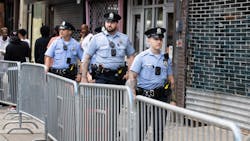Panel: Philly PD Can Replace Some Officers with Civilians
Philadelphia may replace some sworn police officers with civilians and create a unit of unarmed traffic enforcement officers, a move city officials say is aimed at freeing up trained police to fight crime amid a historic surge in gun violence.
The changes were announced Tuesday by city officials and the union that represents Philadelphia police officers, who sat on an arbitration panel that also included a neutral member.
As part of the pact, the city will also pay $1,700 retention bonuses to current police officers and offer $2,000 bonuses to new hires. The benefits come as the Philadelphia Police Department is experiencing a severe staffing shortage after a wave of retirements and resignations over the last two years.
RELATED:
- Audit Finds Philadelphia Police Department Has Inconsistent Strategies, Outdated Systems
- Philadelphia Police Ordered to Work 12-Hour Work Shifts
The award also requires the city to pay a $1.5 million lump sum to the Fraternal Order of Police Lodge 5′s legal fund.
Hundreds of Philly police officers work administrative jobs that could be done by civilians, a study found
Mayor Jim Kenney said the agreement "represents a major step forward as we work to enhance public safety, as it will improve our ability to keep Philadelphians safe by strategically deploying civilians to support the Department's work while allowing police officers to focus on critical law enforcement tasks."
"Civilianization puts more 'boots-on-the-ground,'" added Police Commissioner Danielle Outlaw, "which is exactly what this department needs in order to better serve our communities."
The agreement does not specify how many civilians may be hired to replace sworn officers, but the change applies to several job categories. The city can create a new Public Safety Enforcement Officer unit to handle traffic enforcement in Center City and on five streets considered to be "high injury."
The officers would also assist the Police Department's abandoned-vehicle unit "for the sole purpose of reducing the current backlog of abandoned vehicles in need of removal." The unit has dwindled in size as a result of staff attrition over the last two years, and some officers were reassigned to fight crime.
The city budget currently includes $1.25 million to hire 28 public safety enforcement officers. The agreement doesn't include a timetable, but City Council President Darrell L. Clarke, who has championed the effort for three years, said he was optimistic the city would begin to hire for the jobs in early 2023.
Under the pact, the department may also hire civilians to fill a handful of roles that have been held by sworn police officers, including mail carriers, graphic designers, body-worn camera technicians, crime-scene unit investigators, audiovisual technicians, and firearms examiners.
Philly has spent $205 million on salaries for injured police since 2017. An audit found little is done to prevent fraud.
Police officers who currently hold the roles may not be transferred out or removed, according to the agreement. But if the police officer leaves the role voluntarily, the department may hire a civilian to fill the position.
Several of those categories were highlighted in a study commissioned by the city in 2020 and conducted by researchers at the University of Pennsylvania. The review found that nearly 900 positions within the 7,000-member department that are currently held by sworn police officers could be filled by civilians.
Philly Police Dept. has inconsistent strategies, slow response times, and outdated systems, city controller says
The force, which is budgeted to have about 6,300 officers, has about 500 vacancies. In addition, hundreds of injury claims have taken cops off active duty, a trend driven in part by abuse of a government disability benefits program. And the department is staring down a wave of impending retirements and is guaranteed to lose at least 200 more officers annually for the next several years, according to pension records analyzed by The Inquirer.
The roster of police officers could fall below 5,200 within the next three years if attrition continues at the same rate, according to a review commissioned by the City Controller's Office. To keep pace, the department would need to more than triple its current rate of recruitment.
John McNesby, president of the Philadelphia FOP, said the agreement is fair to both sides.
"Any time you go into something like this, you don't come out without any scratches," he said. "It is going to be able to keep officers here in Philadelphia, and it's going to be able to attract people to come and be a police officer and put some money in their pocket."
___
(c)2022 The Philadelphia Inquirer
Visit The Philadelphia Inquirer at www.inquirer.com
Distributed by Tribune Content Agency, LLC.
